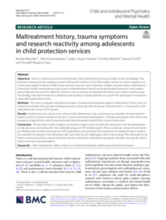This page contains documents and other resources related to children's care in the Americas. Browse resources by region, country, or category.
Displaying 641 - 650 of 1438
This article focuses on the “zero-tolerance” policy adopted in spring, 2018, in the USA. The implementation of this policy resulted in the forced separation of children from their families and the violation of human rights of those detained in authorized facilities and foster care.
This article focuses on the “zero-tolerance” policy adopted in spring, 2018, in the USA.
The importance of mental and behavioral health for child welfare clients is well-documented; yet, little is known about the challenges therapeutic service providers (TSPs) experience working in child welfare practice. To explore this topic, five focus groups were conducted with 40 TSPs in a contracted mental and behavioral health agency and data were analyzed following an inductive thematic process.
The objective of this study was to identify factors associated with difficult parenting experiences and placement disruption.
This open access study compared self-reported impact of research participation against maltreatment history and current post-traumatic stress symptomatology among a randomly selected group of adolescents (< 18 years old) in the child protection service (CPS) system.
This article aims to identify risk and protective factors associated with families returning to the US child welfare system within a social ecological framework, to identify gaps in the current literature, and to discuss areas for future research.
To explore the viability of positive youth development for youth in care, this observational study investigated whether participation in a summer camp-based reunification program for siblings separated by foster care in the US and Australia called Camp To Belong influenced youth resilience, a critical protective mechanism for maltreated youth.
This article provides a review of the literature in attachment theory, outcomes of being in foster care, impacts of trauma, and long-term attachment outcomes of foster care alumni.
This presentation is the result of a critical discourse analysis study which explored the stories–through interviews, observations, and journals–of three young adult women who aged out of the foster care system in a region of Central Tennessee.
This study explores the qualitative responses of child welfare workers in Florida to understand their collaboration experiences, focusing specifically on their perceptions of facilitative factors of collaboration with Intimate partner violence (IPV) services.


